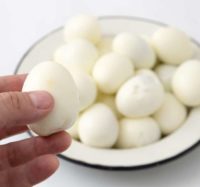A study that claims egg yolks increase the risk of plaque buildup in the arteries gained traction in the media recently. The authors, two of whom happen to receive perks from pharmaceutical companies like Pfizer and Merck, have led the witch-hunt against eggs for a while.
The authors assume that egg whites are innocent bystanders when it comes to heart disease, leading others to believe that one part of this natural food is healthy while the other will kill you. The truth is the researchers neglected to interpret their own data correctly as they tried desperately to prove an obvious falsehood.
Egg Eaters Have Lower “Bad” LDL Cholesterol and Triglycerides
 LDL is a sorely misunderstood protein. It has many important jobs in the body, including immune system support, conversion into vitamin D in the presence of sunlight, and transportation of nutrients throughout the body.
LDL is a sorely misunderstood protein. It has many important jobs in the body, including immune system support, conversion into vitamin D in the presence of sunlight, and transportation of nutrients throughout the body.
Fluffy, buoyant LDL repairs damage to artery walls caused by diet and lifestyle factors.
LDL becomes dangerous when it becomes oxidized. Oxidized LDL, or VLDL, is a small, dense protein that gets under the endothelium and builds up, leading to hardened arteries. Things like sugar consumption, stress, and smoking all contribute to the oxidation of LDL.
Authors of the recent egg study failed to mention that study subjects who consumed more egg yolks actually ended up having lower LDL than those who ate fewer eggs. Egg yolks increase the amount of fluffy LDL in proportion to VLDL. They also reverse the oxidized VLDL, transforming them into functional, fluffy LDL.
Those who ate the most eggs had lower triglycerides than the other groups, reducing their risk of heart disease. It is interesting to note that the LDL, HDL, and triglyceride levels were lower In the egg lovers despite their higher rates of diabetes and smoking.
Eat Eggs to Lose Weight
The authors also fail to mention that the people in the high egg consumption group had lower BMIs than those who ate fewer eggs. Replacing high carbohydrate foods with high protein foods is a healthy way to lose weight.
Eggs are loaded with nutrients, including protein, which helps to maintain steady blood glucose (sugar) levels. Eating eggs in place of carbohydrate-rich foods helps to promote a healthy weight and decreased body fat.
Eggs Contain a Host of Vital Nutrients
Eggs are not only an economical source of protein, but they also contain an amazing concentration of vitamins and minerals. Those who choose egg whites over yolks lose the vast majority of benefits provided by this superfood.
Yolks are a great source of B vitamins, making them especially beneficial for those who don’t enjoy eating meat. They also contain vitamins A and D, which perform a number of important duties throughout the body that include maintaining tooth, bone, and skin health. Eggs also provide vitamin E, which protects against heart disease and some forms of cancer.
Plaque Formation Increases With Age, Not Egg Consumption
Those who ate the most eggs may have had the greatest plaque area in this study, but they were also almost 15 years older than the group with the least amount of accumulation. The authors even recognize that plaque buildup increases with age.
Hardening of the arteries occurs after repeated damage to the artery wall caused by the same factors that oxidize LDL: stress, smoking, sugar consumption, and a variety of other non-egg-yolk factors.
Those who wish to improve health markers, reverse disease, and maintain an optimal weight should replace high-carbohydrate foods with natural whole foods like eggs. This versatile superfood is excellent for breakfast, lunch, dinner, or as a snack. In spite of the misguided conclusions of researchers, a dish of farm fresh eggs provides a nutritious meal that promotes healthy weight and reduced risk of heart disease.
Resources:
Harcombe, Zoe. “Egg Yolk Consumption, Carotid Plaque & Bad Science.” Zoe Harcombe: Because Everything You Know about Obesity Is Wrong, 08 Aug. 2012. Web. 25 Jan. 2017.
Kresser, Chris. “Three Eggs a Day Keep the Doctor Away!” Chris Kresser. N.p., 23 May 2008. Web. 25 Jan. 2017.
Naughton, Tom. “More On The Egg Yolk Study.” Fat Head. N.p., 23 Aug. 2012. Web. 25 Jan. 2017.
Dobson, Roger. “Egg Yolks Linked to Heart Disease.” The Independent. Independent Digital News and Media, 05 Aug. 2012. Web. 25 Jan. 2017.








